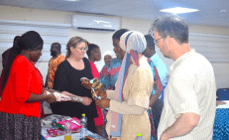By Peter Martey AGBEKO
In a bold and welcome move, Ghana’s Finance Minister, Dr. Cassiel Ato Forson, recently announced a GHC 292.4 million allocation in the 2025 national budget to provide free sanitary pads to female students in primary and secondary schools.
The budget also includes significant tax waivers on locally produced menstrual hygiene products—an initiative widely praised as a step forward for menstrual equity.
But as encouraging as this development is, it has also raised concerns. Advocacy groups warn that the policy may unintentionally exclude girls outside the formal school system—particularly those in apprenticeship programmes—who remain highly vulnerable to period poverty and its cascading effects, including sexual exploitation and teenage pregnancy. They urge government to broaden the scope of the initiative to ensure no girl is left behind.

Amid this policy momentum, the Ghana Standards Authority (GSA), under the leadership of Director-General Prof. Alex Dodoo, is positioning Ghana at the forefront of a global conversation on menstrual health and hygiene.
GSA is actively participating in the work of ISO Technical Committee (TC) 338, which is developing international standards for menstrual products.
The standards cover four key categories: single-use pads and tampons, reusable cloth-based products (such as pads or underwear), and menstrual cups.
As part of this effort, GSA and SIS have undertaken a twinning agreement (secretariate twinning and P-Member twinning) to enable cooperation between the two standards institutions in building capacity in the development of standards for menstrual products.
The kick off meeting to announce the agreement was held virtually on the 3rd of March 2025 with a follow up physical meeting in Accra between the 20th to the 26th of March 2025.
Joakim Falk (Secretary support, ISO TC 338) and Jenny Acaralp (Committee Manager, ISO TC 338), during their visit, held collaborative sessions with the GSA Standards Directorate and stakeholders within the Menstrual hygiene sector.
The draft international standard on General and Safety requirement was also reviewed by sector players to get a national position to present at the upcoming plenary of the ISO TC 338 in Nairobi. f. Together, the team conducted field visits to local enterprises that produce reusable fabric pads.
The objective is clear: to ensure menstrual products are safe, effective, and inclusive—across cultures, geographies, and economic conditions.
For Ghana, the intersection of government policy and international standard-setting presents a unique opportunity to lead both nationally and globally in the fight against menstrual inequity.
As Prof. Dodoo noted during the stakeholder engagement, “Menstrual health is not just a women’s issue—it’s a societal one. Setting the right standards is key to dignity, health, and empowerment for every girl and woman.”
With political will and technical leadership aligning, Ghana’s commitment is proving to be more than just a pad in a schoolgirl’s bag. It is a statement—a bold declaration that menstrual health matters.










